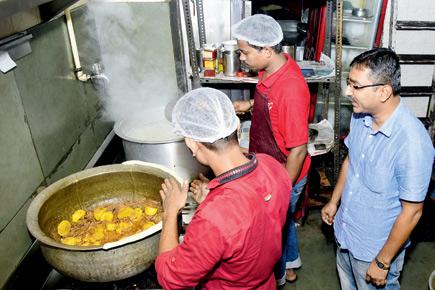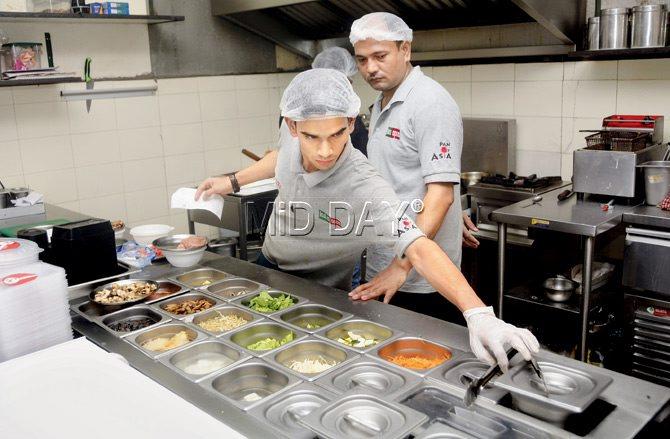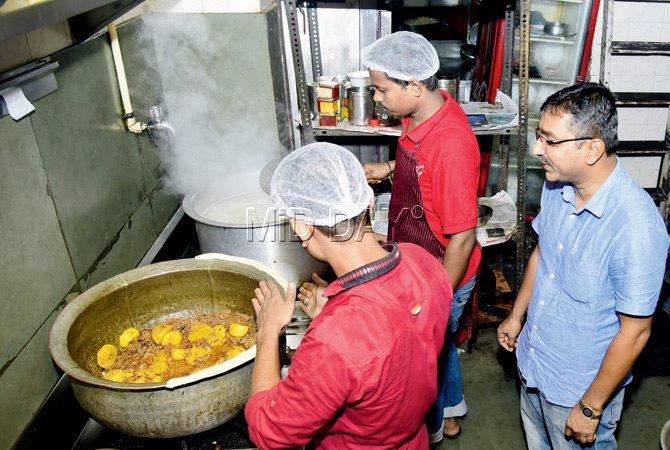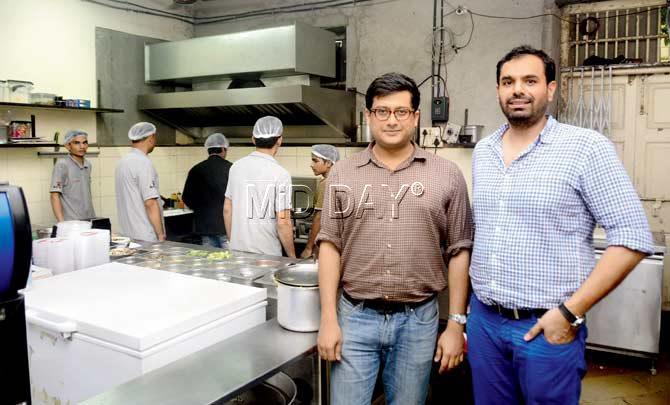Mumbai restaurants reinvent centralised kitchens to beat rising real estate prices and serve more customers through tiny takeaway outlets. Hassan M Kamal reports

Chef and owner Sougata Sengupta (right) at the centralised kitchen of Feeast@East, Mahim.
![]() Patel building comes across as just another nondescript location near Lower Parel railway station, in the lane leading to the Mathuradas Mills Compound. However, its ground floor has been buzzing with activity over the last few months. Work begins at 10 am when the staff arrives. By 10.30 am, a delivery van begins unloading carefully marked food containers and packets. Around 11 am, the staff, most of them now dressed in kitchen attire and protective caps, gear to take orders for three takeaway brands — Pao and Bao, Indus Opus and Pan of Asia.
Patel building comes across as just another nondescript location near Lower Parel railway station, in the lane leading to the Mathuradas Mills Compound. However, its ground floor has been buzzing with activity over the last few months. Work begins at 10 am when the staff arrives. By 10.30 am, a delivery van begins unloading carefully marked food containers and packets. Around 11 am, the staff, most of them now dressed in kitchen attire and protective caps, gear to take orders for three takeaway brands — Pao and Bao, Indus Opus and Pan of Asia.
ADVERTISEMENT
 The central kitchen of Pao and Bao, Pan of Asia, and Indus Opus. PICs/Bipin Kokate
The central kitchen of Pao and Bao, Pan of Asia, and Indus Opus. PICs/Bipin Kokate
Meanwhile, operations have also started early morning in Marol, the centralised kitchen of Ceres Hospitality Pvt Ltd, a three-year-old start-up that owns Pao and Bao and Pan of Asia, and Morsel Products (that owns Indus Opus). In another part of town, in Mahim, operations begin at 5.30 am at the restaurant-cum-centralised kitchen of Feeast@East, a multi-chain restaurant that serves Kolkata-style rolls and Bengali food in the city. The two-and-half-year-old company recently opened an outlet in Worli. While the Mahim outlet, which also serves as a centralised kitchen, is massive, other outlets are smaller.

Chef and owner Sougata Sengupta (right) at the centralised kitchen of Feeast@East, Mahim. Pic/Shadab Khan
Though a relatively old-concept, centralised kitchens like these have re-emerged, allowing restaurateurs in the city to cater to a wider audience and control quality across outlets. Charcoal, that serves biryani, recently started Chilli Flakes, a gourmet pizza delivery space that runs from the same kitchen. There’s also Ammi’s Biryani, a multi-chain Mughlai takeaway service.

(From left) Deb Mukherjee and Harsh Patel of Ceres Hospitality
Economics of scale
“The concept is to offer the three different brands to customers, using the same back-end, keeping costs down, and also offering products at an attractive price,” says Deb Mukherjee of Ceres Hospitality (co-founded with Harsh Patel) that runs the centralised kitchen in Marol.
The popularity of the concept is more a need of the hour, as real estate prices soar city, says Sougata Sengupta, founder and owner of Feeast@East. “My running cost for a new outlet has come down by more than 50 per cent” he says, citing the example of his Worli outlet that runs out of a 100 sq ft takeaway joint. “I would have been paying at least R70,000 (per month) in rentals if I had to open an outlet with a kitchen and chefs to prepare the food. But with this setup, I do n’t need more than an 100 sq ft area that costs me just R20,000 a month,” he informs. “What this also means is that I don’t have to hire a senior chef at every outlet,” agrees Mukherjee. The savings, from rentals, both say, have helped their companies, provide better facilities to employees, and also hire well-trained hands from across India.
Quality control
“For a multi-chain eatery like ours, maintaining the same taste and quality across outlets was a challenge that having a centralised kitchen solved,” says Sengupta, adding, “We semi-prep most items (barring Chinese) like breads, fillings, sauces, curries or marinades for chicken, lamb and mutton, and dim sums, in advance, and transport it to the locations on the same day. Thus, we are able to control taste and quality and maintain it across outlets.”
Feeast@East has hired taxis that transport food from Mahim to all its outlets across the city along with its trained staff. By 11, they are at their stations, ready to serve Kolkata Rolls, biryani, and freshly prepared Chinese dishes. “All the staff has to do is, heat the food, and serve it to our customers,” adds Sengupta. But while Sengupta runs only one brand, (Feeast@East), Mukherjee and his team have managed to launch three takeaway brands using the same assembly. Pao and Bao that serves snack bites, Pan of Asia serves Chinese delicacies while Indus Opus specialises in Indian cuisine like curries, parathas and rice preparations like biryani. Until now, Mukherjee and his team have been fairly successful. “The three brands have already broken even (R15k per day business) in Marol and Lower Parel, and we are hoping to achieve the same in Powai soon,” says Mukherjee. The first van leaves Marol around 8.30 am. It reaches Powai by 9.30, and thereafter, heads to Lower Parel reaching there at 10.30 am.
While the method helps standardise quality across outlets, Mukherjee informs that the biggest boon had been reduced production time that enables quicker deliveries. “Fast deliveries are of utmost importance for any takeaway brand. Every fast delivery means a happy customer, which in turn relates to them thinking of us next time they decide to order food,” he reasons.
Tech matters
But all of this wouldn’t have been possible without technology supporting various back end operations like inventory management, point of sale and call centres, to prevent losses due to wastage by using smart metrics.
Ceres uses a cloud-based end-to-end system provided by Torqus, a tech startup, that links call centres to every point of sale unit at an outlet and to the inventory there as well as at the central kitchen. So, the moment a portion of Biryani or Bao is ordered, the system automatically updates the inventory at the takeaway kitchen as well as the base kitchen. “We receive orders from multiple points — our call centres, websites of the three takeaways as well as via food aggregators like Swiggy and Zomato. The system helps us track all of them together at one point, and takes into account the average sales in a week, and as per demand, it creates an order list for the satellite sites. It also records any unique spikes on particular days of the week, and adjusts order sizes accordingly” reveals Mukherjee.
Feeast@East relies on a point-of-sale system provided by Posist, which is linked to a third-party inventory management system called Lime Tray. All software is mapped to a certain delivery area. As soon as an order is placed, it’s sent to the location, and updated.
But the biggest benefit that integration of technology with the business model of the centralised kitchen has introduced is that Mukherjee and Sengupta can track every minute detail of the eateries on their smartphones — from the status of an order, to their daily/weekly performance to the inventory status from anywhere in the world. “I have an app that I can use to check minute-by-minute sales by channels. I am aware at any point how a particular unit is doing what kind of sale in real time. The customer also gets intimated about it. If it’s pouring in Lower Parel, we can instruct the software to give frequent updates to customers. We aim to deliver in 45 minutes. It also keeps a tab on his profile and past orders. It helps us push products,” explains Mukherjee.
 Subscribe today by clicking the link and stay updated with the latest news!" Click here!
Subscribe today by clicking the link and stay updated with the latest news!" Click here!






